

Your pay and conditions. A number of agreements cover members in the early childhood sector, but most assistants (including activity group leaders) and teachers (including preschool field officers and preschool advisers) are now covered by the Victorian Early Childhood Teachers and Assistants Agreement (VECTAA 2009) or the Local Government Early Childhood Education Employees Agreement (LGECEEA 2009).
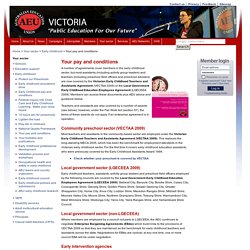
Members can access these documents plus AEU advice and guidance below. Teachers and assistants are also covered by a number of awards (see below); however, under the Fair Work Act (section 57), the terms of these awards do not apply if an enterprise agreement is in operation. Community preschool sector (VECTAA 2009) Most teachers and assistants in the community-based sector are employed under the Victorian Early Childhood Teachers and Assistants Agreement (VECTAA 2009). This replaces the long-standing MECA 2005, which has been the benchmark for employment standards in the Victorian early childhood sector. Awards. Www.education.vic.gov.au/Documents/childhood/providers/regulation/enrolmentrecords.pdf. What does leadership look like in early childhood settings? (free article) - Early Childhood Australia.
The requirement for leadership in early childhood education and care (ECEC) settings has and always will be a priority because of the link between high-calibre leadership and better outcomes for young children. … the context of early childhood is continually changing and becoming increasingly complex.
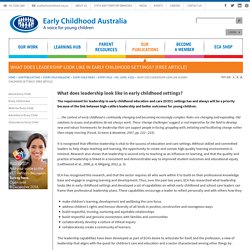
Roles are changing and expanding. Old solutions to issues and problems do not always work. These ‘change challenges’ suggest a real imperative for the field to develop new and robust frameworks for leadership that can support people in facing, grappling with, initiating and facilitating change rather than simply reacting (Fasoli, Scrivens & Woodrow, 2007, pp. 232—233).
It is recognised that effective leadership is vital to the success of education and care settings. ECA has recognised this research, and that the sector requires all who work within it to build on their professional knowledge base and engage in ongoing learning and development. Every Child magazine – vol. 18 no. 4, 2012. Privacy law changes to affect childcare and education sector - m+k Lawyers. 11 Feb 2014 Australia’s Privacy laws will change on 12 March 2014.The current 10 “National Privacy Principles” (“NPPs”) will be replaced with 13 Australian Privacy Principles (“APPs”).
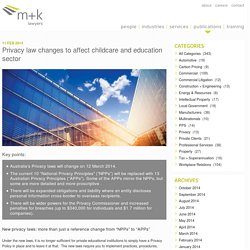
Some of the APPs mirror the NPPs, but some are more detailed and more proscriptive .There will be expanded obligations and liability where an entity discloses personal information cross-border to overseas recipients.There will be wider powers for the Privacy Commissioner and increased penalties for breaches (up to $340,000 for individuals and $1.7 million for companies). New privacy laws: more than just a reference change from “NPPs” to “APPs” Under the new laws, it is no longer sufficient for private educational institutions to simply have a Privacy Policy in place and to leave it at that. The new laws require you to implement practices, procedures, documentation and systems to ensure and to verify compliance.
Commenting is not available in this channel entry. National Education Leader. Welcome to the National Education Leader’s information and resource page.
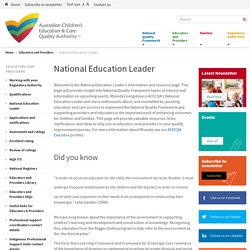
This page will provide insight into National Quality Framework topics of interest and information on upcoming events. Rhonda Livingstone is ACECQA's National Education Leader and she is enthusiastic about, and committed to, assisting education and care services to implement the National Quality Framework and supporting providers and educators in the important work of enhancing outcomes for children and families. This page will provide valuable resources, links, clarifications and ideas to help you as educators and providers in your quality improvement journey. For more information about Rhonda, see our ACECQA Executive profiles. “In order to act as an educator for the child, the environment has to be flexible: it must undergo frequent modification by the children and the teachers in order to remain.
Early Childhood Education, Kindergarten, Early Learning. Integrated Service Development : Integrated Service Development. Integrated children's centres are service centres or hubs in which various programs such as child care, playgroups, preschools and maternal and child health services are provided in a seamless service.
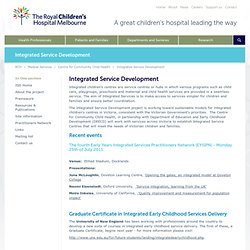
The aim of Integrated Services is to make access to services simpler for children and families and ensure better coordination. The Integrated Service Development project is working toward sustainable models for integrated children's centres in Victoria, consistent with the Victorian Government's priorities. The Centre for Community Child Health, in partnership with Department of Education and Early Childhood Development (DEECD) will work with services across Victoria to establish Integrated Service Centres that will meet the needs of Victorian children and families. Recent events The fourth Early Years Integrated Services Practitioners Network (EYISPN) - Monday 25th of July 2011 Venue: Etihad Stadium, Docklands Presentations: